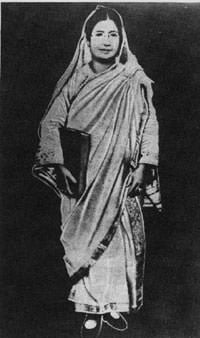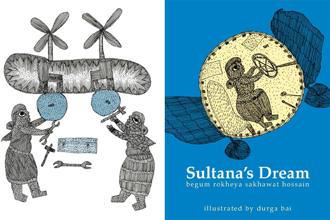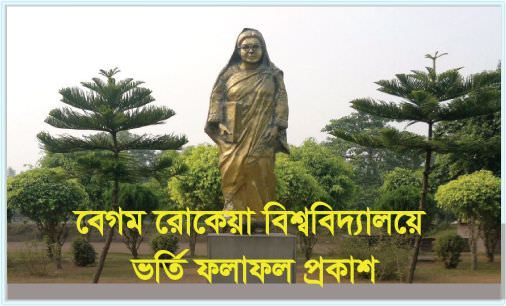Born in 1880, at the peak of British colonisation of India, Begum Rokeya lived a short, yet meaningful life. A Bengali writer and activist, she has often been touted as the pioneer feminist of Bengal. A fierce advocate of gender equality, Rokeya wrote many short stories, novels, poems, satire and essays, calling for women to be treated equally as men. She held the lack of education to be responsible for women lagging behind men in her writings.

She has long represented the face of Muslim feminism in Bengal. She pushed for an equal society through her writings and activism, as well as her actions and strategy. She also founded a girls’ school, and an NGO named Anjuman-e-Khawatin-e-Islam (Islamic Women’s Association). Despite facing several obstacles and criticism, Rokeya went door-to-door, encouraging men to send their daughters to school, and continued the campaigning till her death.
Some of her major literary works include Abarodhbasini, in which she attacked the extreme forms of veils and purdah, which she claimed was bad for women, and stopped them from thinking and working independently. Begum Rokeya also wrote a science fiction novella, Sultana’s Dream, in which she lives in a feminist utopian world ruled by women.
Early Life and Work
Rokeya Begum was born in Pairabondh village of Rangpour. Her father, a local landlord, married 4 times, and imposed a strict veiling upon the women of his family. No formal education was allowed for women in his house, and only Arabic was taught informally, so they could recite the Quran and perform Islamic religious rites.
However, defying the rules laid out by her father, Rokeya, along with her sister Karimunesa insisted upon learning Bangla – the local language – much to their father’s disdain. The Bengali Muslims preferred using Arabic or Persian as a language to produce media. However, their brother Ibrahim Saber decided to teach them.
Rokeya married the Deputy Magistrate of Baghalpur, Sakhwat Hussain, who was then a divorced 39-year old. Having studied in England, Hussain was a liberal person, who encouraged his wife to learn both Bengali and English. During the lifetime of her husband, she started her literary career and launched books like Motichur and Sultana’s Dream.
Rokeya led a hard life, full of personal losses and tragedies. She didn’t get her mother’s love and attention, her husband passed away early in their married life and she lost two daughters in their infancy.
She faced severe resistance from the society for her writings and activism to change its attitude towards women. She attempted to inform them of the world outside of their homes, kitchens, of things other than clothes and jewellery. She inspired the Bengali Muslim women to wake up from the patriarchal slumber and accept their individualities and created a slogan, “Jago Go Bhogini” (Wake Up Sisters).
Career as a Writer and Activist
At the peak of her career, Rokeya had learnt Bangla, Urdu, English, Persian and Arabic. However, much of her literary work is in Bangla, excluding a few stories in English. One of her first novellas, Sultana’s Dream was also in English, in which she reversed the gender roles and portrayed women as dominant gender. Although she started writing about reforming the society in as early as 1903, a two-volume compilation of which was published in 1908 and 1921 respectively. She published a novel, Padmaraga in 1924, and another, Oborodhbashini in 1928.

Rokeya started off her school, Sakhawat Memorial Girls’ School in the memory of her late husband. In 1911, when the foundation was laid in Kolkata, there were only 8 students. However, the strength increased to 84 by 1915, and it became a high school in 1930. Among the many subjects taught at the school, the most prominent ones were nursing, sewing, home economics, Bangla and English. She believed it was very important for women to be strong physically, so she focused more on physical activity in her school. Through practical training, Rokeya aimed at enabling women to be economically independent, whenever needed.

Having faced the issues being a woman herself, Rokeya decided to launch Anjuman-e-Khawanteen-e-Islam (Islamic Women’s Association) in 1916. Much of the organisation’s work focused on helping women coming from poorer backgrounds. Along with offering financial help, the organisation also provided shelter to women in need. She also launched a program to help women living in slums learn reading, writing and child care.
Her profile by The Daily Star noted, “Begum Rokeya believed that men and women were created differently, but equally… the subjugated position of women was not due to Allah’s will, but due to men’s immorality.”
It also pointed out her use of logic to resist the idea that women were created inferior to men. “Had God Himself intended women to be inferior, He would have ordained it so that mothers would have given birth to daughters at the end of the fifth month of pregnancy. The supply of mother’s milk would naturally have been half of that in case of a son. But that is not the case. How can it be? Is not God just and most merciful?” it read.
Eliza Binte Elahi of The Asian Age writes, “Rokeya believed that men deliberately refuse women equal opportunities to cultivate their minds with the purpose of sustaining women’s dependence on men and further perpetuating women’s dependence on their own inferior status. Rokeya used examples of women who earn more than their husbands, but still submit to the men folk at home to point out that the framework of women’s subjugation exceeds economic parameters.”
Rokeya died on December 8, 1932, while working on an article titled Narir Odhikar.
Famous Publications
Begum Rokeya’s work has a distinctive style, in which she inculcates logic, creativity and humour. She started her career writing for a magazine called Nabanoor, and throughout her career, she asked women to stand up for their rights and protest the injustice they face and encouraged them to break the barriers holding them back from progress. Some of her famous writings are as follows:
- Motichur (Two volumes, first published in 1904, second in ’22)
- Sultana’s Dream
- Pipasha (Thirst)
- Padmarag (Essence of the Lotus, published in 1924)
- God Gives, Man Robs (Published in 1927)
- Boligarto (story)
Legacy
Her death anniversary is commemorated as Rokeya Day on December 9 in Bangladesh. A state-run public university named Begum Rokeya University was launched by the government in 2008.

The Bangladeshi government also launched a national honour titled Begum Rokeya Padak for her contributions towards the literature and betterment of women in Bengal. The Padak has been given to 39 women till now for their exceptional work to promote women rights.


No comments:
Post a Comment